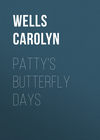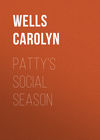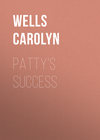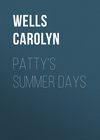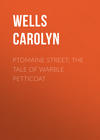Kitabı oku: «Patty's Butterfly Days», sayfa 5
CHAPTER IX
BIG BILL FARNSWORTH
"How are you?" exclaimed a voice as hearty as the kiss, and Patty, with a wild spring, jumped from the encircling arms, and turned to face a towering giant, who, she knew at once, must be Mr. Farnsworth.
"How DARE you!" she cried, stamping her foot, and flashing furious glances, while her dimpled cheeks burned scarlet.
"Whoopee! Wowly-wow-wow! I thought you were Mona! Oh, can you EVER forgive me? But, no, of course you can't! So pronounce my doom! Shall I dash myself into the roaring billows and seek a watery grave? Oh, no, no! I see by your haughty glare that is all too mild a punishment! Then, have me tarred and feathered, and drawn and quartered and ridden on a rail! Send for the torturers! Send for the Inquisitioners! But, remember this! I didn't know I was kissing a stranger. I thought I was kissing my cousin Mona. If I had known,—oh, my dear lady,—if I had KNOWN,—I should have kissed you TWICE!"
This astonishing announcement was doubtless induced by the fact that Patty had been unable to resist his wheedlesome voice and frank, ingenuous manner, and she had indulged in one of her most dimpled smiles.
With her face still flushed by the unexpected caress, and her golden curls still rumpled from the baby's mischievous little fingers, Patty looked like a harum-scarum schoolgirl.
"Be careful," she warned, shaking a finger at him. "I was just about to forgive you because of your mistake in identity, but if you make me really angry, I'll NEVER forgive you."
"Come back, and ALL will be forgiven," said the young man, mock-dramatically, as he held out his arms for a repetition of the scene.
"This is your punishment," said Patty, gaily, paying no attention to his fooling. "You are not to tell of this episode! I know you'll want to, for it IS a good joke, but I should be unmercifully teased. And as you owe me something for—for putting me in a false position–"
"Delightful position!" murmured the young man.
"You owe me SOMETHING," went on Patty, severely, "and I claim your promise not to tell any one,—not even Mona,—what you did."
"I WON'T tell," was the fervent reply. "I swear I won't tell! It shall be OUR secret,—yours and mine. Our sweet secret, and we'll have another some day."
"What!"
"Another secret, I mean. What DID you think I meant? Any one is liable to have a secret,—any two, I mean. And we might chance to be the two."
"You're too big to talk such nonsense," and Patty ran a scornful eye over the six feet three of broad and weighty masculinity.
"Oh, I KNOW how big I am. PLEASE don't rub THAT in! I've heard it ever since I was out of dresses. Can't you flatter me by pretending I'm small?"
"I could make you FEEL small, if I told you what I really thought of you."
"Well, do that, then. What DO you think of me?"
"I think you very rude and—"
"You don't think any such thing,—because you KNOW I mistook you for Mona, and it's not rude to kiss one's cousin."
"Is she your cousin? She never told me so."
"Well, her grandfather's stepdaughter's sister-in-law married my grandmother's second cousin twice removed."
"Oh, then you're not very nearly related."
"No; that's why we don't look more alike. But, do you know my name? Or shall I introduce myself?"
"I fancy you're Big Bill Farnsworth, aren't you?"
"Yes,—but DON'T call me big, PLEASE!"
"No, I'll call you Little Billee. How's that?"
"That's lovely! Now, what may I call you?"
"Miss Fairfield."
The big man made an easy and graceful bow. "I am delighted to meet you, Miss Fair—Fair, with golden hair. Pardon me, I've a terrible memory for names, but a good reserve fund of poetry."
"Miss Fairfield, my name is. Pray don't forget it again."
"If you're so curt, I shall think it's a Fairfield and no favour! You're not mad at me, are you?"
"Certainly not. One can't get mad at an utter stranger."
"Oh, I don't think people who kiss people can be classed as utter strangers."
"Well, you will be, if you refer to that mistake again! Now, remember, I forbid you ever to mention it,—to me, or to any one else. Here comes Mona."
Mona and Daisy Dow appeared in the doorway, and seeing Bill, made a dash at him. The young man kissed Mona heartily, and as he did so, he smiled at Patty over Mona's shoulder. He shook hands with Daisy, and soon the three were chatting gaily of old school days.
Then Roger Farrington came. Not all of Patty's New York friends had liked Mona, but Roger had always declared the girl was a fine nature, spoiled by opulent surroundings. He had gladly accepted the invitation to the house party, and came in anticipation of an all-round good time.
"Hooray! Patty! Here's me!" was his salutation, as he ran up the steps.
"Oh, Roger!" cried Patty, and she grasped his hand and showed unfeigned gladness at seeing him. Patty was devoted to her friends, and Roger was one of her schoolday chums. Mona came forward and greeted the new guest, and introduced him to the strangers.
"Isn't this just too downright jolly!" Roger exclaimed, as he looked at the sea and shore, and then brought his gaze back to the merry group on the veranda. "Haven't you any chaperon person? Or are we all kids together?"
"We have two chaperons," announced Patty, proudly. "One, you may see, just down that rose path. The lady in trailing lavender is our house chaperon, Mrs. Parsons. The impressive looking personage beside her is an artist of high degree. But our other chaperon,—ah, here she comes! Mrs. Kenerley."
Adele Kenerley appeared then, looking very sweet and dainty in her fresh summer frock, and laughingly expressed her willingness to keep the house party in order and decorum.
"It won't be so very easy, Mrs. Kenerley," said Roger. "My word for it, these are wilful and prankish girls. I've known Miss Fairfield for years, and she's capable of any mischief. Miss Galbraith, now, is more sedate."
"Nonsense!" cried Patty. "I'm the sedate one."
"You don't look it," observed Mona. "Your hair is a sight!"
"It is," said Laurence Cromer, coming up and catching the last remark; "a sight for gods and men! Miss Fairfield, I beseech you, don't do it up in fillets and things; leave it just as it is, DO!"
"Indeed I won't," said Patty, and she ran away to her own room to put her curly locks in order. She was quite shocked at the mirrored picture of tousled tresses, and did it all up a little more severely than usual, by way of amends.
"May I come in?" and Daisy Dow, after a quick tap at the door, walked in, without waiting for an answer.
"What lovely hair!" she exclaimed, as Patty pushed in more and more hairpins. "You're a perfect duck, anyway. I foresee I shall be terribly jealous of you. But I say, Patty,—I MAY call you Patty, mayn't I?—don't you dare to steal Big Bill Farnsworth away from me! He's my own particular property and I don't allow trespassing."
There was an earnest tone underlying Daisy's gay words that made Patty look up at her quickly. "Are you engaged to him?" she asked.
"No,—not exactly. At least, it isn't announced. But—"
"Oh, pshaw, don't trouble to explain. I won't bother your big adorer. But if he chooses to speak to me, I shan't be purposely rude to him. I like boys and young men, Miss Dow, and I like to talk and play and dance with them. But I've no SPECIAL interest in any ONE, and if you have, I shall certainly respect it,—be sure of that."
"You're a brick, Patty! I was sure you were the minute I laid my two honest grey eyes on you. But you're 'most too pretty for my peace of mind. Bill adores pretty girls."
"Oh, don't cross bridges before you come to them. Probably he'll never look at little me, and if he should, I'll be too busy to see him. There ARE others, you know."
Reassured by Patty's indifference, Daisy vowed her everlasting friendship and adoration, and the two went downstairs arm in arm.
The veranda presented a gay scene—afternoon tea was in progress, and as some of the Spring Beach young people had dropped in, there were several groups at small tables, or sitting on the veranda steps and railings.
"I've saved a lovely seat for you," said Laurence Cromer, advancing to Patty; "just to show you that I'm of a forgiving nature."
"Why, what have I done to be forgiven for?" asked Patty, opening her blue eyes wide in surprise.
"You've spoiled your good looks, for one thing. You HAD a little head sunning over with curls, and now you have the effect of a nice little girl who has washed her face and hands and neatly brushed her hair."
"But one can't go around like Slovenly Peter," said Patty, laughing, as she took the wicker chair he placed for her.
"Why not, if one is a Pretty Peter?"
"Oh, pshaw, I see you don't know me very well. I never talk to people who talk about me."
"Good gracious, how can they help it?" "Well, you see, I'm accustomed to my girl and boy friends, whom I've known for years. But here, somehow, everybody seems more grown up and societyfied."
"How old are you?"
"It's my impression that that's a rude question, though I'm not sure."
"It isn't, because you're not old enough to make it rude. Come, how old?"
"Nineteen, please, sir."
"Well, that's quite old enough to drop boy and girl ways and behave as a grown-up."
"But I don't want to," and Patty's adorable pout proved her words.
"That doesn't matter. Your 'reluctant feet' have to move on whether they wish to or not. Are you bashful?"
"Sorta," and Patty put her finger in her mouth, with a shy simper.
"You're anything but bashful! You're a coquette!"
"Oh, no!" and Patty opened her eyes wide in horror. "Oh, kind sir, DON'T say THAT!"
But Cromer paid no heed to her words; he was studying her face. "I'm going to paint you," he announced, "and I shall call it 'Reluctant Feet.' Your head, with its aureole of curls; your wide eyes, your baby chin—"
"Oh, Roger!" cried Patty, as young Farrington came toward her. "What DO you think? Mr. Cromer is going to paint a picture of my head and call it 'Reluctant Feet'! He says so."
"Yes," said Cromer, unconscious of any absurdity; "Miss Fairfield is a fine subject."
"That's better than being called an object," said Roger, joining them, "and you DID look an object, Patty, when I arrived! Your wig was all awry,—and—"
"You haven't a soul for art?" said Cromer, looking solemnly at Roger.
"No, I haven't an artful soul, I fear. How are you getting along, Patty, down here without your fond but strict parents?"
"Getting along finely, Roger. Aunt Adelaide plays propriety, and Mona and I keep house."
"H'm, I'm 'fraid I scared off our long-haired friend," said Roger, as Cromer rose and drifted away. "Never mind, I want to talk to you a little myself. I say, Patsy, don't you let these men flatter you till you're all puffed up with pride and vanity."
"Now, Roger, AM I that kind of a goose?"
"Well, you're blossoming out so, and getting so growny-uppy looking, I'm 'fraid you won't be my little Patty-friend much longer."
"'Deed I shall! Don't you worry about that. How do you think Mona is looking?"
"Fine! Lots better than when I saw her in May. She dresses better, don't you think?"
"Yes, I guess she does," said Patty, demurely, with no hint as to WHY Mona's appearance had improved. "She's an awfully nice girl, Roger."
"Yes, I always said so. And you and she help each other. Sort of reaction, you know. What do we do down here?"
"Oh, there are oceans of things planned. Parties of all sorts, and picnics, and dances, and motor trips, and every old thing. How long can you stay?"
"I'm invited for a week, but I may have to go home sooner. Isn't that Western chap immense?"
For some ridiculous reason, Patty blushed scarlet at the mere mention of Mr. Farnsworth.
"What the—oh, I say, Patty! You're not favouring him, are you? Why, you've only just met him to-day, haven't you?"
"Yes, certainly; I never saw him before. No, I'm not favouring him, as you call it."
"Then why are you the colour of a hard-boiled lobster? Patty! quit blushing, or you'll burn up!"
"Don't, Roger; don't be silly. I'm NOT blushing."
"Oh, no! You're only a delicate shade of crimson vermilion! Well, if you want him, Patty, I'll get him for you. Do you want him now?"
"No! of course I don't! Do be still, Roger! And stop that foolish smiling! Well, then, I'm going to talk to Adele Kenerley."
Patty ran away from Roger, who was decidedly in a teasing mood, and seated herself beside the pretty young matron.
"Such a GOOD child," Mrs. Kenerley was saying; "she NEVER cries, and she's SO loving and affectionate."
"Oh, she's a heavenly baby!" cried Mona, in raptures of appreciation, and then along came the baby's father, fresh from his ocean dip.
"You must choke off my wife," he said, smiling, "if she gets started on a monologue about that infant prodigy! She can keep it up most of the hours out of the twenty-four, and go right over it all again next day!"
"And why not?" cried Mona. "SUCH a baby deserves appreciation. I can hardly wait till to-morrow to wake her up and play with her."
"She's a good enough kiddy," said the proud young father, trying to hide his own enthusiasm.
"Now, Jim," cried his wife, "you know perfectly well you're a bigger idiot about that child than I am! Why, would you believe, Mona—"
"There, there, Adele, if you're going to tell anecdotes of my parental devotion, I'm going to run away! Come on, Farnsworth, let's go for a stroll, and talk over old times."
The two men walked off together, and the party generally broke up. Most of them went to their rooms to rest or dress for dinner, and Patty concluded that she would grasp the opportunity to write a letter to Nan, a task which she enjoyed, but rarely found time for.
"The house party is upon us," she wrote, "and, though they're really very nice, they ARE a little of the west, westy. But there's only one girl, Daisy Dow, who's MUCH that way, and I rather think I can manage her. But already she has warned me not to interfere with her young man! As if I would!"
Just here, Patty's cheeks grew red again, and she changed the subject of her epistolary progress.
"The baby is a perfect darling, and her parents are very nice people. TERRIBLY devoted to the infant, but of course that's to be expected. Roger is a comfort. It's so nice to have an old friend here among all these strangers. Oh, and there's an artist who, I know, spells his art with a big A. He wants to paint me as 'Cherry Ripe' or something, I forget what. But I know his portraits will look just like magazine covers. Though,—I suppose I AM rather of that type myself. Oh, me! I wish I were a tall, dark beauty, with melting brown eyes and midnight tresses, instead of a tow-headed, doll-faced thing. But then, as the poet says, 'We women cannot choose our lot.' I'm in for a good time, there's no doubt about that. We've parties and picnics and pageants piled up mountain high. So if I don't write again very soon, you'll know it's because I'm a Social Butterfly for the time being, and these are my Butterfly Days. Aunt Adelaide is rather nicer than when I last wrote. She gets on her 'company manners,' and that makes her more amiable."
"My goodness gracious!"
This last phrase was spoken aloud, not written, for the low, open window, near which Patty sat writing, was suddenly invaded by a laughing face and a pair of broad, burly shoulders, and Big Bill's big voice said, "Hello, you pretty little poppet!"
CHAPTER X
JUST A SHORT SPIN
"Stop! Look! Listen!" cried Patty, gaily, as the unabashed intruder calmly seated himself on the broad, low window-sill. "Do you consider it good manners to present yourself in this burglarious fashion?"
"Well, you see, my room opens on this same veranda,—indeed the veranda seems to run all around the house on this story,—and so I thought I'd walk about a bit. Then I chanced to spy you, and—well, I'm still spying. Is this your dinky boudoir? How fussy it is."
"I like it so," said Patty, smiling.
"Of course you do. You're fussy yourself."
"I am not! I'm NOT fussy!"
"Oh, I don't mean that the way you think I do. I mean you're all dressed fussy, with pink ribbons and lace tassels and furbelows."
"Yes; I do love frilly clothes. Now, I suppose your ideal girl wears plain tailor-made suits, and stiff white collars, and small hats without much trimming,—just a band and a quill."
"Say, that's where you're 'way off! I like to see girls all dollied up in squffly lace over-skirts,—or whatever you call 'em,—with dinky little bows here and there."
"Is this frock all right, then?" asked Patty, demurely, knowing that her summer afternoon costume was of the very type he had tried to describe.
"Just the ticket! I'm not much on millinery, but you look like an apple blossom trimmed with sunshine."
"Why, you're a poet! Only poets talk like that. I doubt if Mr. Cromer could say anything prettier."
"'Tisn't pretty enough for you. Only a chap like Austin Dobson could make poetry about you."
The earnest sincerity in the big blue eyes of the Westerner robbed the words of any semblance of impertinence, and Patty spoke out her surprise.
"Why, do you read Austin Dobson? I never thought—"
She paused, lest she hurt his feelings by her implication, but Farnsworth went on, quietly:
"You never thought a big, hulking fellow like me could appreciate anything exquisite and dainty, either in poetry or in people," he said. "I don't blame you, Miss Fairfield; I am uncouth, uncultured, and unmannered. But I am fond of books, and, perhaps by the law of contrast, I am especially fond of the Minor Poets."
"You shan't call yourself those horrid names," said Patty, for his tones rang true, and she began to appreciate his honest nature; "no one can be uncouth or uncultured who loves such reading. Don't you love the big poets, too?"
"Yes; but I suppose everybody does that. I say, won't you come outside for a bit? That room is stuffy, and the air out here now is great. Couldn't you skip down with me for a whiff of the sea?"
"Why, I ought to be dressing for dinner."
"Oh, there's lots of time yet. Come on. Don't tell anybody, just fly out at this window, like Peter Pan, and we'll elope for half an hour."
Acting impulsively, Patty swung herself through the low window, and had descended the picturesque outside stairway that led from the upper veranda to the lower one before she remembered Daisy's prohibition.
"Oh, I think I won't go down to the beach," she said, suddenly pausing at the foot of the stairs. "I must go right back."
"Nothing of the sort," and Farnsworth grasped her arm and fairly marched her along the path to the gate. "You're not a quitter, I know, so what silly notion popped into your head just then?"
Patty laughed outright at his quick appreciation of her mood.
"Well," she parried, "you see, I don't know you very well."
"All the more reason for snatching this chance to get acquainted."
"Somebody might see us."
"Let them. It's no crime to stroll down to the beach."
"Somebody might object to my monopolising you like this."
"Who, Mona?"
"No; not Mona."
"Who, then?"
"Is there no one who might justly do so?"
"No, indeed! Unless Mrs. Parsons thinks I'm neglecting her."
"Nonsense. I don't mean her. But, what about Miss Dow?"
"Daisy Dow! Well, Miss Fairfield, I'm a blunt Westerner, and I don't know how to say these things subtly, but when you imply that Daisy has any special interest in me, you do me undeserved honour. I've known her for years, and we're good chums, but she'd have no right to comment if I walked down to the sea, or into it, or across it. NOW, will you be good?" They had reached the beach, and stood looking at the great rollers coming in, their white crests tinged by the last rays of the setting sun, which flashed a good-bye at them from the opposite horizon.
"It's fortunate you Eastern people have a sea," Farnsworth said, as he gazed across the black distance, "or you wouldn't know the meaning of the word space. Your lives and living are so cramped."
"You Western people have a sea, too, I believe," said Patty.
"Yes, but we don't really need it, as you do. We have seas of land, rolling all over the place. We can get our breath inland; you have to come to the ocean to get a full breath."
"That's the popular superstition. I mean, that we are cramped and all that. But, really, I think we all have room enough. I think the Westerner's idea of wanting several acres to breathe in is just a habit."
Farnsworth looked at her steadily. "Perhaps you're right," he said; "at any rate, you seem to know all about it. Do you suppose I could learn to see it as you do?"
"Of course you could. But why should you? If you like the West, the big, breezy, long-distance West, there's no reason why you should cultivate a taste for our little cramped up, stuffy East."
"That's right! But I wish I could show you our country. Wouldn't you love to go galloping across a great prairie,—tearing ahead for illimitable miles,—breathing the air that has come, fresh and clean, straight down from the blue sky?"
"You make it sound well, but after that mad gallop is over, what then? A shack or ranch, or whatever you call it, with whitewashed walls, and rush mats and a smoky stove?"
"By George! You're about right! It wouldn't suit YOU, would it? You couldn't fit into that picture!"
"I'm 'fraid not. But if we're going to fit into the picture soon to assemble in Mona's dining-room, we must make a start in that direction. Mr. Farnsworth—"
"Call me Bill, oh, DO call me Bill!"
"Why should I?"
"Because I want you to; and because I think you might make that much concession to my Western primitiveness and unceremoniousness."
"But I don't like the name of Bill. It's so,—so—"
"So uncouth? Yes, it is. But I'm not the sort to be called William.
Well, DO call me something pleasant and amiable."
"I'll call you Little Billee. That's Thackeray's, and therefore, it's all right. Now, can you slip me back into my own apartments as quietly as you took me away?"
"Of course I can, as it's nearly dark now. Here we go!"
He aided her up the stairs, and along the balcony to her own windows. Patty sprang lightly over the low sill, and waved her hand gaily as she pulled down her blinds and flashed on the electric lights. Then she rang for Janet, and found that a hurried toilette was necessary if she would be prompt at dinner.
One of Patty's prettiest evening frocks was a dainty French thing of white chiffon, decked with pale green ribbons and exquisite artificial apple blossoms made of satin. With a smile at the memory of Farnsworth's allusion to apple blossoms, she put it on, and twisted a wreath of the same lovely flowers in her golden crown of curls.
Then she danced downstairs to find the Western man awaiting her. He looked very handsome in evening clothes, and the easy unconsciousness of his pose and manner made him seem to Patty the most attractive man she had ever seen.
"I've arranged it with Mona," he said, straightforwardly, "and I'm to take you in to dinner. I want to sit next to you."
But Patty had caught sight of Daisy Dow, and the angry gleam in that young woman's eyes warned Patty that Farnsworth's plan boded trouble.
Moreover, perverse Patty objected to being appropriated so calmly, and with a deliberate intent to pique Farnsworth, she replied, gaily:
"Nay, nay, fair sir; it suits me not, thus to be parcelled out. We Eastern girls are not to be had for the asking."
The smile she flashed at him brought an answering smile to Farnsworth's face, but as he stepped forward to urge her to grant his wish, Patty slipped her hand in Roger's arm, and joined the others who were already going to the dining-room.
She had quickly seen that this move on her part would leave Farnsworth no choice but to escort Daisy Dow, for Roger had been assigned to that fair maiden.
"What's up?" enquired Roger, as he obediently followed Patty's whispered order to "come along and behave yourself."
"Nothing," returned Patty, airily; "I have to have my own way, that's all; and as my old friend and comrade, you have to help me to get it."
"Always ready," declared Roger, promptly, "but seems to me, Pitty-Pat, the colossal cowboy is already a Willing Willy to your caprices."
"Don't be silly, Roger. He's so unused to our sort of society that he's willing to bow down at the shrine of any pretty girl."
"Oh, Patsy-Pat! Do you consider YOURSELF a pretty girl? How CAN you think so? Your nose turns up, and I think you're a little cross-eyed—"
"Oh, Roger, I am not!"
"Well, perhaps I'm mistaken about that; but you've a freckle on your left cheek, and a curl on your right temple is out of place."
"It isn't! I fixed it there on purpose! It's supposed to look coquettish."
"Very untidy!" and Roger glared in pretended disapproval at the curl that had purposely been allowed to escape from the apple-blossom wreath.
Patty liked Roger's fooling, for they were old chums and thoroughly good friends, and it was one of his customary jokes to pretend that he was trying to correct her tendency to personal vanity.
Beside the house party, there were several other guests, mostly Spring Beach cottagers, and the dinner was a gay one. Jack Pennington sat at Patty's other side, and Farnsworth and Daisy Dow were far away, near the head of the table.
"Dashing girl, Miss Dow," said Jack, as he looked at the vivacious Daisy, who was entertaining those near her with picturesque stories of Western life.
"Yes, indeed," said Patty; "and very clever and capable."
"Now, isn't it funny! Just from the way you say that, I know you don't like her."
Patty was dismayed. If she didn't altogether like Daisy, she had no wish to have other people aware of the fact.
"Oh, Jack, don't be mean. I DO like her."
"No, you don't; at least, not very much. She isn't your style."
"Well, then, if you think that, don't say it. I MUST like Mona's guests."
"Yes, of course. Forgive a poor, blundering idiot! And don't worry, Patty, no one shall ever know from me that you and the Dashing Daisy aren't boon companions."
"You're so nice and understanding, Jacky boy, and I'm much obliged. Do you remember the night you discovered who our chaperon was, and you helped me out so beautifully?"
"Always glad to help the ladies. What are we doing to-night, after this feast of fat things is over?"
"Nothing especial; dance a little, I suppose, sit around on the veranda, sing choruses, and that sort of thing."
"There's a glorious full moon. Couldn't we escape for a little spin? Just a very short one, in my runabout?"
"Yes, I'd love to. Or we could take my runabout."
"Or Mona's for that matter. I don't care what car we take, but I do love a short, quick drive, and then come back for the dance."
"All right, I'll go. Mona won't mind, if I don't stay long."
"Oh, only just around a block or two. Just to clear the effect of these flowers and candles from our brain."
"Isn't your brain a little weak, if it can't stand flowers and candles?" asked Patty, laughing.
"Perhaps it is, and perhaps that's only an excuse to get away. Hooray! Mona's rising now; let's make a mad dash."
"No; that isn't the way. Let's slide out quietly and inconspicuously, through this side door."
Adopting this idea, Jack and Patty went out on a side veranda, and stepped across the terrace to the garden paths. The moonlight turned the picturesque flower-beds to fairy fields, and Patty paused on one of the terrace landings.
"I don't know as I want to go motoring, Jack," she said, perching herself on the marble balustrade; "it's so lovely here."
"Just as you like, girlie. Ha! methinks I hear vocal speech! Some one approacheth!"
Farnsworth and Daisy Dow came strolling along the terrace, and Daisy took a seat beside Patty, while the two men stood in front of them.
"Won't you girls catch cold?" said Farnsworth, in his matter-of-fact way.
"These be not mortal maidens," said Jack, who was in whimsical mood. "These be two goddesses from Olympian heights, who have deigned to visit us for a brief hour."
"And unless you're very good to us," observed Patty, "we'll spread our wings and fly away."
"Let's do something," said Daisy, restlessly; "it's poky, just sitting here, doing nothing. I'd like to go in the ocean. It must be lovely to bounce around in the surf by moonlight."
"You'd bounce into bed with pneumonia," said Patty. "But Jack and I were talking of motoring. Suppose we take two runabouts and go for a short spin."
All agreed, and the quartette went to the garage for the cars.
The head chauffeur, who was not of an over kindly disposition, informed them that Miss Galbraith's runabout was out of commission for the moment, though Miss Fairfield's was in good shape.
"I'll get mine," proposed Jack, but Bill Farnsworth said, "No, I don't understand an electric awfully well. Let's take this car. I can run this O.K., and it will hold the four of us."
"All right," said Jack; "we're only going a few blocks up the beach.
Hop in, Patty."
Farnsworth and Daisy sat in front, and Patty and Jack behind, and they started off at a brisk speed. The girls declined to go back to the house for wraps, as it was a warm evening, and the ride would be short. But when Farnsworth found himself with the wheel in his hand and a long stretch of hard, white road ahead of him, he forgot all else in the glory of the opportunity, and he let the car go at an astonishing speed.
"Isn't this fun!" cried Patty, but the words were fairly blown away from her lips as they dashed along.
"This is the way we Westerners ride!" exclaimed Daisy, as she sat upright beside Bill, her hair streaming back from her forehead, the light scarf she wore round her neck flapping back into Patty's face.
"It's grand!" gasped Jack. "But I hope Big Bill knows what he's about."
"You bet he does!" replied Bill himself, and they whizzed on.
Patty had never gone so fast. Though it was a warm night, the rush of wind chilled her, and she shivered. Jack, seeing this, picked up a lap-robe and wrapped it about her.
"Don't want to turn back yet, do you?" he asked.
"We must turn soon," Patty managed to reply, but Jack scarcely heard the words.
The big moon was setting when Bill turned the car inland, and shouting, "We're going to drive straight into that moon!" made a mad dash toward it.
